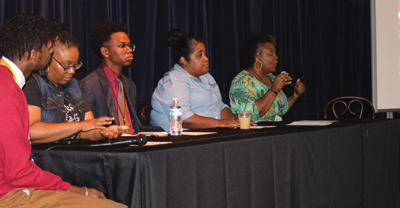
By Erica R. Williams, Special to The New Tri-State Defender
“Don’t be afraid to disrupt the system,” Shelby County Commissioner Tami Sawyer said to a crowd of advocates, parents, and educators gathered at the inaugural Public Policy and Restorative Justice Symposium.
This charge came after Sawyer gave a personal account of her experiences with racial biases while at-tending a local private middle school, where she said there were only a handful of other Black students.
“I was the only person in my class to ever get detention,” she said. “I would get it for things like being stopped in the hall because they thought my skirt was too short, although I was the tallest girl in 7th and 8th grade. Or because they thought I was talking back when I asked questions.”
Sawyer, who was the first guest speaker at the symposium, set the tone for the conversations that would follow throughout the five-hour event, hosted by the Memphis Restorative Justice Coalition. The Memphis-based group consists of a collection of four organizations working together to reduce the rate of suspensions for African American and Latino students.
“There are so many people in silos doing this work, but there hasn’t been a space where people can all come together and do it collectively,” said Tim Green, co-founder of the symposium and founder & executive director of The Dividend, a social emotional empowerment organization for youth.
Saturday’s panelists included Pametria Brown (empowerment expert), Shahidah Jones (Black Lives Matter), Archie Moss Jr. (principal, Bruce Elementary) and Cameron Jones (recent high school graduate). State Sen. Raumesh Akbari (D-29) served as the moderator for the panel.
Earlier this year, Akbari co-sponsored a bill requiring local education organizations to provide adverse child-hood experiences (ACEs) training to teachers. During the symposium, the Akbari noted that understanding childhood trauma could aid in preventing some disciplinary infractions and biases.
Organizers of the event said the symposium grew from an immense need to have conversations surrounding restorative justice practices in schools. Emerging statistics back up their claims.
According to a 2019 study conducted by a group of Princeton University researchers, African American students are four times more likely to be suspended than white students. The study also suggests that these students usually face more challenging life outcomes as a result of the harsh disciplinary actions.
“When I was in the classroom in 2012, that’s when I saw how much we needed restorative practices in schools,” Green said. “I saw students get suspended for things that we could have just talked about.”
Cameron Jones, the youngest panelist, gave his personal account of biases while a student.
“I noticed that I was treated differently when I wore Jordans than when I wore button-ups and chinos,” said Jones. “There were definitely predetermined stereotypes.”
Dr. Joris Ray, Shelby County Schools superintendent, who received the Pioneer in Justice Award at the symposium, said he and his team have restorative justice plans in the works for the 2019-20 school year.
“How are we going to change the narrative for all children particularly African American males?” he asked the crowd rhetorically, adding that his leadership team will launch an equity office within SCS.
“I look forward to pioneering justice for all students.”
According the Restorative Justice Coalition, although suspension rates are down in SCS, 95 percent of the students who receive suspension are African American or Latino.
“We have an opportunity to move Memphis forward through our kids,” Sawyer said. “And it starts with restorative justice.”
With a long-term goal of establishing partnerships with local schools to facilitate mandatory restorative justice training, organizers said the symposium is just a small piece of the puzzle.
“We are making restorative justice public policy gumbo,” Green said during the event.
“And we hope everyone who attended the symposium will leave with something that they can take back to their homes or schools to begin implementing immediately.”


Be the first to comment